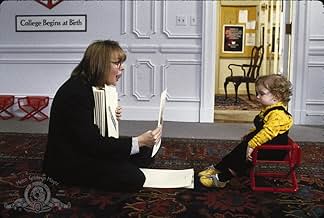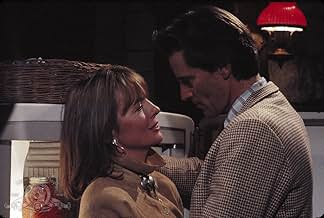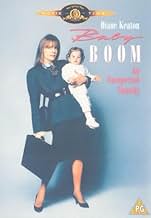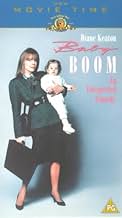सुपर-यप्पी जेसी की जिन्दंगी में तब उथल-पुथल होती है जब उसे दूर के रिश्तेदार का बच्चा विरासत में मिलता है.सुपर-यप्पी जेसी की जिन्दंगी में तब उथल-पुथल होती है जब उसे दूर के रिश्तेदार का बच्चा विरासत में मिलता है.सुपर-यप्पी जेसी की जिन्दंगी में तब उथल-पुथल होती है जब उसे दूर के रिश्तेदार का बच्चा विरासत में मिलता है.
- पुरस्कार
- 5 कुल नामांकन
कहानी
क्या आपको पता है
- ट्रिवियाWhen Kristina and Michelle Kennedy were in college, they found out that Diane Keaton was doing a book signing in Southampton, New York. They showed up and when Keaton was doing signings, they placed the photo for Keaton to sign. Keaton remarked on the photo that she'd been thinking about the twins the other day. When she went to sign, she looked at the sisters, back to the photo and realized it was them. Keaton subsequently got up and hugged them both. The sisters later went onto become teachers.
- गूफ़In the beginning of the film, the narrator states that J.C. has a corner office. When the office appears a few minutes later, it's in the middle, with a window.
- भाव
Delivery Boy: [confirming J.C.'s delivery order] One cold mist humidifier, one electric steam vaporizer, one baby thermometer, one baby Tylenol, baby nose drops, baby cough medicine and... bottle of Valium?
J.C. Wiatt: Oh, yeah, uh... that's for me.
Delivery Boy: [nods] Mm.
- साउंडट्रैकEverchanging Times
Written by Burt Bacharach, Carole Bayer Sager and Bill Conti
Performed by Siedah Garrett
Courtesy of Qwest Records
Produced by Burt Bacharach, Carole Bayer Sager and David Foster
फीचर्ड रिव्यू
As anyone who has walked a mile or two knows, life is about choices and making decisions. And a lot of that has to do with realizing and setting priorities, because-- as a wise person once said-- You Can't Have It All. It's the lesson we all learn in our own way in our own time, according to our own personal situation, and director Charles Shyer examines one of them in his amiable comedy, `Baby Boom,' starring Diane Keaton.
J.C. Wiatt (Keaton) is a high-powered businesswoman on the fast track to success; she knows what she wants, has set her priorities, and a partnership in the firm for which she works is on the horizon. Her live-in significant other, Steven (Harold Ramis), is of a like mind-set, so they complement one another's life style perfectly. Marriage and/or having children is in neither of their respective vocabularies. then one day, J.C. `inherits' a baby, the child of a distant relative (a cousin she'd met only once) who has been killed in a tragic accident, and suddenly, J.C.'s world is turned upside down. Keeping the baby is out of the question, of course. Or is it? For J.C., it just may not be as simple as it seems, initially. She's been living life on her own terms, but now she is once again faced with choices, decisions and setting priorities. And along the way, she learns one of life's most important lessons: The fact that the lesson never ends.
There's some amusing moments and some insights to be gleaned from Shyer's film, and overall it's a pleasant, enjoyable experience. It is not, however, an entirely original idea, and Shyer laces it with stereotypes and cliches to boot. This is not necessarily a bad thing, though. If his characters are stereotypical, it's because they reflect a certain realism. J.C.'s boss, Fritz Curtis (Sam Wanamaker), for instance, typifies the image of a dedicated, hard-core businessman whom you get the feeling has to consult his day planner to work in an appointment with his own family. A stereotype? Perhaps. A reflection of reality? Definitely. The same can be said for Sam Shepard's character, Dr. Jeff Cooper, who personifies the general image of one in his situation. And again, it is a reflection of reality, stereotypical though it may be.
Even the cliches are handled in a way that makes them fresh enough to work within the context of the story, and be appreciated-- especially by those in the audience who may have experienced any of the situations presented here. When J.C. fumbles with a diaper and becomes frustrated with her own inexperience and incompetence with such things, it's cliche, but it also rings true-to-life. The important thing is, it's all well presented and actually pretty funny stuff, even if it isn't anything new.
Shyer wrote the screenplay, along with Nancy Meyers, and one angle they may have failed to cultivate fully has to do with Ken, the character played by James Spader. As J.C.'s in-house adversary, also striving to climb the corporate ladder, it may have been intrinsically more interesting had the character been a woman. The fact that Ken is a man, again, makes this particular situation fairly cliche; whereas a competitive conflict with another woman, considering J.C.'s predicament, would have expanded the avenues of possibility to a much greater extent, and certainly would have provided a more imaginative perspective.
The main reason the film works as well as it does, however, is because of the engaging performance by Diane Keaton. In J.C., she creates the antithesis of Annie Hall, but even at her most demanding there is a hint of vulnerability in J.C., a softness to that hard exterior edge she uses to shoulder her way through the business world. Keaton gives you a real sense of the conflict she's experiencing, and though it's lightheartedly rendered for the most part, you understand the underlying seriousness of it all. And the scene in which she vents her frustrations and bares her soul to Dr. Cooper is classic. Keaton's work is without question the highlight of the film, and what really brings it to life.
The supporting cast includes Pat Hingle (Hughes Larabee), Britt Leach (Verne), Kim Sebastian (Robin), Mary Gross) Charlotte, Patricia Estrin (Secretary)Victoria Jackson (Eve), Jane Elliot (Park Mom) and Linda Ellerbee (Narrator). An upbeat, entertaining film, `Baby Boom' may not be particularly memorable, but it does provide some laughs, and at the same time says something about the value of being given the opportunity to question the things we `think' we want. Kind of like saying `Never say never.' After all, who can say with any certainty where destiny may lead any of us? It's something a film like this may make you consider, inbetween the chuckles. It's the magic of the movies. I rate this one 7/10.
J.C. Wiatt (Keaton) is a high-powered businesswoman on the fast track to success; she knows what she wants, has set her priorities, and a partnership in the firm for which she works is on the horizon. Her live-in significant other, Steven (Harold Ramis), is of a like mind-set, so they complement one another's life style perfectly. Marriage and/or having children is in neither of their respective vocabularies. then one day, J.C. `inherits' a baby, the child of a distant relative (a cousin she'd met only once) who has been killed in a tragic accident, and suddenly, J.C.'s world is turned upside down. Keeping the baby is out of the question, of course. Or is it? For J.C., it just may not be as simple as it seems, initially. She's been living life on her own terms, but now she is once again faced with choices, decisions and setting priorities. And along the way, she learns one of life's most important lessons: The fact that the lesson never ends.
There's some amusing moments and some insights to be gleaned from Shyer's film, and overall it's a pleasant, enjoyable experience. It is not, however, an entirely original idea, and Shyer laces it with stereotypes and cliches to boot. This is not necessarily a bad thing, though. If his characters are stereotypical, it's because they reflect a certain realism. J.C.'s boss, Fritz Curtis (Sam Wanamaker), for instance, typifies the image of a dedicated, hard-core businessman whom you get the feeling has to consult his day planner to work in an appointment with his own family. A stereotype? Perhaps. A reflection of reality? Definitely. The same can be said for Sam Shepard's character, Dr. Jeff Cooper, who personifies the general image of one in his situation. And again, it is a reflection of reality, stereotypical though it may be.
Even the cliches are handled in a way that makes them fresh enough to work within the context of the story, and be appreciated-- especially by those in the audience who may have experienced any of the situations presented here. When J.C. fumbles with a diaper and becomes frustrated with her own inexperience and incompetence with such things, it's cliche, but it also rings true-to-life. The important thing is, it's all well presented and actually pretty funny stuff, even if it isn't anything new.
Shyer wrote the screenplay, along with Nancy Meyers, and one angle they may have failed to cultivate fully has to do with Ken, the character played by James Spader. As J.C.'s in-house adversary, also striving to climb the corporate ladder, it may have been intrinsically more interesting had the character been a woman. The fact that Ken is a man, again, makes this particular situation fairly cliche; whereas a competitive conflict with another woman, considering J.C.'s predicament, would have expanded the avenues of possibility to a much greater extent, and certainly would have provided a more imaginative perspective.
The main reason the film works as well as it does, however, is because of the engaging performance by Diane Keaton. In J.C., she creates the antithesis of Annie Hall, but even at her most demanding there is a hint of vulnerability in J.C., a softness to that hard exterior edge she uses to shoulder her way through the business world. Keaton gives you a real sense of the conflict she's experiencing, and though it's lightheartedly rendered for the most part, you understand the underlying seriousness of it all. And the scene in which she vents her frustrations and bares her soul to Dr. Cooper is classic. Keaton's work is without question the highlight of the film, and what really brings it to life.
The supporting cast includes Pat Hingle (Hughes Larabee), Britt Leach (Verne), Kim Sebastian (Robin), Mary Gross) Charlotte, Patricia Estrin (Secretary)Victoria Jackson (Eve), Jane Elliot (Park Mom) and Linda Ellerbee (Narrator). An upbeat, entertaining film, `Baby Boom' may not be particularly memorable, but it does provide some laughs, and at the same time says something about the value of being given the opportunity to question the things we `think' we want. Kind of like saying `Never say never.' After all, who can say with any certainty where destiny may lead any of us? It's something a film like this may make you consider, inbetween the chuckles. It's the magic of the movies. I rate this one 7/10.
टॉप पसंद
रेटिंग देने के लिए साइन-इन करें और वैयक्तिकृत सुझावों के लिए वॉचलिस्ट करें
- How long is Baby Boom?Alexa द्वारा संचालित
विवरण
बॉक्स ऑफ़िस
- US और कनाडा में सकल
- $2,67,12,476
- US और कनाडा में पहले सप्ताह में कुल कमाई
- $13,57,413
- 12 अक्तू॰ 1987
- दुनिया भर में सकल
- $2,67,12,476
इस पेज में योगदान दें
किसी बदलाव का सुझाव दें या अनुपलब्ध कॉन्टेंट जोड़ें




































